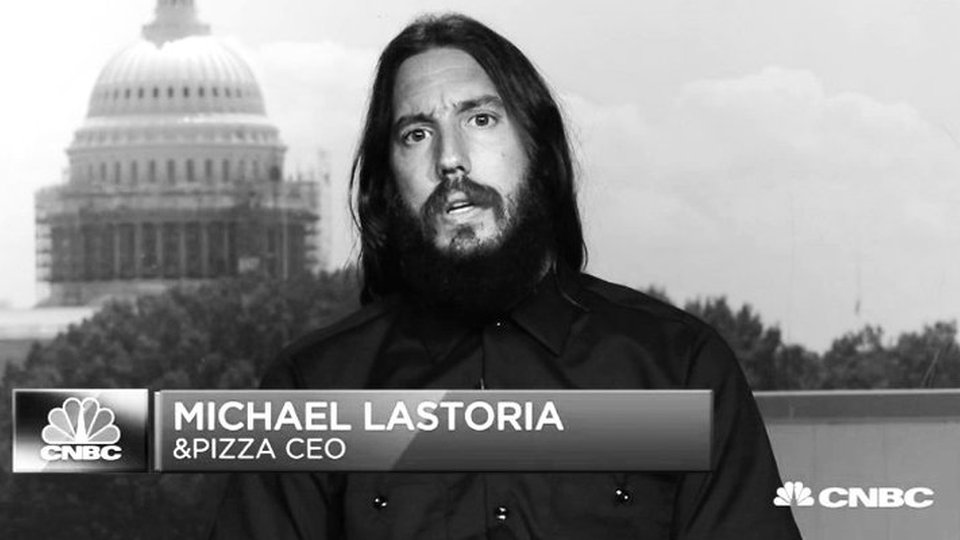Independent Operators
&Pizza CEO: 'Now is the right time for hourly wage increase'
&Pizza CEO Michael Lastoria, who disagrees with the National Restaurant Association's stance against raising the federal minimum wage to $15 an hour, said paying workers more is not only the right thing to do, but would also increase consumer spending and productivity in the workplace while lowering poverty rates and improving mental health.

February 16, 2021
By Michael Lastoria, &Pizza, CEO
The evidence is clear: the $15 minimum wage is a win for workers and a win for the economy. Instituting a higher minimum wage isn't just the moral decision, it's the common sense one. At a time when our country is beginning to heal from the wounds of the past year, we have a unique opportunity in front of us to lift millions out of poverty, empower the working class and stimulate the economy.
The government's failure to raise the minimum wage even 1 cent over the past decade is shameful and a complete abdication of its duty. When the minimum wage was introduced after the great depression, it was to stave off our country falling into that desolation again. The pandemic has laid bare just how much the government has failed to live up to that ideal. We've all seen the pictures of hundreds of cars lined up for food banks, the checkmark shaped economic recovery and the dismal jobs numbers. 1 in 7 American households say they don't have enough food to eat. If the $7.25 minimum wage was good for the economy, I'd love to see a single example of that.
It's time for this country to face some hard facts about the minimum wage. Since 2009, the last time the government bothered to raise the minimum wage, the cost of living in this country has risen 20% and the cost of housing has risen 30%. Costs will rise regardless of whether or not employers pay their workers a living wage. A person working 40 hours a week in a minimum wage job is living below the poverty line. This is why we have so many Americans working multiple jobs who still rely on government assistance; because no one in America can live on $290 a week (minus taxes!). Today's minimum wage has more than 30% less purchasing power than it did in 1968 — a time when the government was as divided as it is today, but still managed to index the minimum wage to inflation.
All throughout the pandemic these are the workers we've been calling essential. The ones who have been asked to assume all of the risk to keep our country going during the pandemic. The fast food industry, grocery stores, agriculture, retail workers — these are the people who are on the front lines every day, ensuring that food can still get to your table, that you can pick up your medication, that you could give presents to your loved ones over the holidays. It's no secret that the vast majority of these jobs are held by women of color — a demographic disproportionately trapped in a low earnings cycle. Refusing to give such a huge segment of the American population the opportunity to make a living wage despite working a 40 hour work-week only highlights what activists have been saying for decades; the American Dream is a relic.
In many ways, the positive outcomes of raising the minimum wage are immeasurable: consumer spending would rise, increased productivity in the workplace, wage increases ripple upwards, poverty rates fall, and improved mental health are only some of the most obvious outcomes of such a move. But there are also measurable metrics: The Institute for Policy Studies estimates that for every additional dollar in a low-wage worker's pocket, $1.21 is added to the overall economy.
Economists have found that a $15 minimum wagewould not reduce employment even in the parts of the country that currently have the lowest wages. A Department of Labor study revealed that job rates grew much faster in states that raised the minimum wage. The examples are endless, but critics of raising the minimum wage refuse to address them.
Like previous labor fights in this country, the opposition relies on conjuring up hypothetical boogie men to prevent genuine progress. Luckily, for advocates and pragmatists alike, we don't have to rely on cherry picked projections from groups funded by special interests or thought experiments hyper-fixated on the worst case scenario. In the United States, we already have eight states and over forty cities that have passed some kind of mandate for the $15 minimum wage. Instead of making policy based on the nightmarish fantasies of lobbyists, we can simply look at the real world effects that instituting the $15 minimum wage has had in places in our country. So let's take a look at the place that's had it the longest: Seattle.
Seattle instituted a phased-in $15 minimum wage in 2014 that once reached would then index the minimum wage to keep pace with rising inflation. Although companies griped, the results are clear: take-home pay was higher for minimum wage employees even if they experienced a reduction in their hours to accommodate the costs. There was no evidence of widespread price increases as a result of the minimum wage ordinance. Job numbers grew, particularly in the very industries critics claim such a wage hike would decimate. Since 2015 (a year after the hike began phasing in) the number of jobs in restaurants and bars rose by 24,000. There's a reason the Biden administration has modeled their minimum wage proposal on the Seattle ordinance -- it is an unmitigated success.
The simple fact is that the $15 minimum wage is not controversial.
In fact, it might be one of the most unifying policies in recent memory; Florida's referendum proves that it appeals to voters across the aisle. It seems the only people opposed are a small sliver of people who repeatedly refuse to engage with reality. It's 2021. It's far past time to move beyond listening to those people.
Editor's note:Click here to read why the National Restaurant disagrees with Lastoria's opinion on raising minimum wage.
 ChatGPT
ChatGPT Grok
Grok Perplexity
Perplexity Claude
Claude





